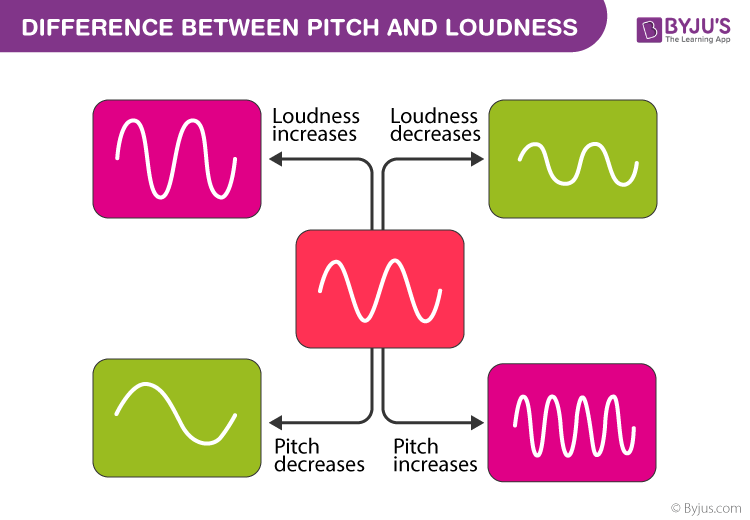In our day-to-day life, we come across different types of sound, and we are well-equipped with a mechanism to understand different types of variations in the sound pattern. A mother talking to her kid has a different voice compared to that of the kid. Have you ever thought about why every person has a different voice? Let’s learn about the loudness of sound, the pitch of the sound, and their difference.
Loudness of Sound
- The phenomenon of sound depends on the amplitude of the sound wave. If the amplitude of the sound wave is large, then the sound is said to be loud.
- It is directly proportional to the square of the amplitude of vibration. If the amplitude of the sound wave becomes double, then the loudness of the sound will be quadrupled.
- It is expressed in decibel (dB).
- Sounds above 80 dB becomes noise to human ears.
- The table given below gives us data for various sources of sound.
| Normal Breathing | 10 dB |
| Soft Whisper (at 5 m) | 30 dB |
| Normal Conversation | 60 dB |
| Busy Traffic | 70 dB |
| Average Factory | 80 dB |
The loudness of a sound wave is determined by its association with the amplitude, all types of waves have a certain amplitude. For example, a height of a wave on a calm ocean will be less than 1 foot whereas good surfing waves might be 10 feet or more in amplitude. During a storm, the amplitude might increase to 40 to 50 feet.
Read More: Sound Waves
Pitch of Sound
- This depends on the frequency of vibration of the waves.
- If the frequency of vibration is higher, we say that the sound is shrill and has a high pitch. On the other hand, if the sound is said to have a lower pitch then it has a lower frequency of vibration.
- A bird produces a high-pitched sound whereas roaring of a lion is a low-pitched sound.
- The voice of a woman has a higher pitch than that of a man.
Difference between Pitch and Loudness
These two phenomena seem to be the same sometimes, but they are not exactly the same. They differ on the basis of their tone quality. The pitch of a sound is our ear’s response to the frequency of sound. Whereas loudness depends on the energy of the wave. In general, the pitch is the reason behind the difference in voice quality of different individuals.

The pitch of a sound depends on the frequency while loudness of a sound depends on the amplitude of sound waves. Amazingly, many musicians, who have been trained are capable of detecting a difference in frequency between two separate sounds that are as little as 2 Hz.
| Loudness | Pitch |
| Loudness is defined as the property of sound which is used for differentiating between the loud and faint sound | Pitch is defined as the characteristic of sound which is used for differentiating between the shrill and flat sound |
| Loudness is dependent on the energy received by the ear in unit time | Pitch is independent of the energy received by the ear in unit time |
| Loudness is independent of the change in frequency | Pitch is dependent on the change in the frequency. As the frequency increases, the shrillness of the sound increases |


It is very important for children
Thanks for this article
Thanks for the explanation.
very good
Excellent explanation of every article and every topic 😊
Nice explanation
Thank you for this explanation.
easy to understand